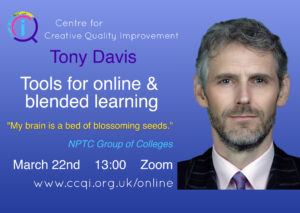Why should we use learning ILT?

Sometime ago, I watched a college observer evaluating a flower-arranging lesson. It was delivered by a pro who gave up her time once a week to run an evening class. And it was one of those lessons you really wished you were involved in, rather than watching!
When the observer fed back, their criticism was that the teacher hadn’t used any learning technology. This gave me a mild moral dilemma. As an observer of the observer, I shouldn’t be challenging in front of the teacher, but the last thing we want is to make this fantastic teacher think twice about giving up her time for the good of the learners. So I chanced my arm..
I simply asked the observer; ‘Why? What impact was missing?’ This caught them a bit by surprise, and they didn’t have an answer, other than that there was a box on the observation form which required the evaluation of ILT.
If there’s any blame to be laid here, it’s not with the teacher or the observer, but with the college’s central team of IT champions.
I love the phrase ‘Technology-Enhance Learning’. We don’t use technology cause it’s a good idea, we use it cause it’s good pedagogy. ILT isn’t an addon, something extra to do and to worry about, it’s just a different, and in many instances much better, way of doing things.
Take Q&A. Done so, so badly by far too many. The purpose of Q&A is to get every learner to process their knowledge and understanding and deliver a realisation. Too often, Q&A is just asking: ‘Can you remember what I’ve just told you?’ But real learning isn’t about recall, it’s about synthesising what we know.
The next problem with Q&A is that far too often it does no more than sample understanding. Teachers either put people on the spot, or ask open questions for anyone (usually the more confident) to answer. Of course, there are loads of ways of doing this, but it’s still sampling. What we want is for every learner to process the answer to the question. But if you do that through Q&A it both takes an age and significantly builds the anxiety of the less-experienced learners. So what’s the answer?
This is just one of the things we’ll be looking at in next week’s open session: Tools for Online and Blended Learning; Wednesday, March 22nd. More details here: www.ccqi.org.uk/toolsforonline. We’ll be looking at 13 learning technologies from the very easy to the more challenging. But don’t be daunted. Technology is just clicking and typing; you just have to know where to click and what to type. That’s the easy bit, but it isn’t what this session is about. This session is dedicated to pedagogy – the ‘reason’: the benefit to you and your learners of technology-enhanced learning. Delegates will use (as learners) each technology, then write a brief evaluation of its value to their work. After the session, delegates are then given access to ‘how-to’ sheets that show you where to click and what to type.
So if you’d like to challenge your current teaching strategies, then do join us next Wednesday. Here are a few more comments from previous delegates:
- ‘It was fantastic to see them being used throughout the session as well as having the opportunity to have a go.’ B-Skill Limited
- ‘‘Learning is like a search for hidden treasure!’ This session for me gave a whole plethora of treasures for engagement and bringing learning and pedagogy to life through digital means both for in class and learning remotely.’ Halton Borough Council
- ‘A smorgasbord of healthy teaching and learning resources.’ Hereford College of Arts
- ‘I loved how it’s given me a new view on teaching the same sorts of subjects, but now it can be done in different ways making it feel less repetitive.’ NPTC Group
You can find more details here: www.ccqi.org.uk/toolsforonline. Do please join us if you can and tag any of your colleagues who might be interested, and/or share with your own networks if you’re able.
By the way, if the flower-arranging tutor had asked her learners to go through their week, looking out for and collecting images of arrangements, then asked them to categorise these in their group’s Pinterest, or social media environments, she’d have been proactively developing their research and evaluation skills, and producing group learning from individual contributions…
#FE #online #blendedlearning #ilt #c4cqi #JoyFE #UKFEchat #TonyDavis




Comments
No comments yet